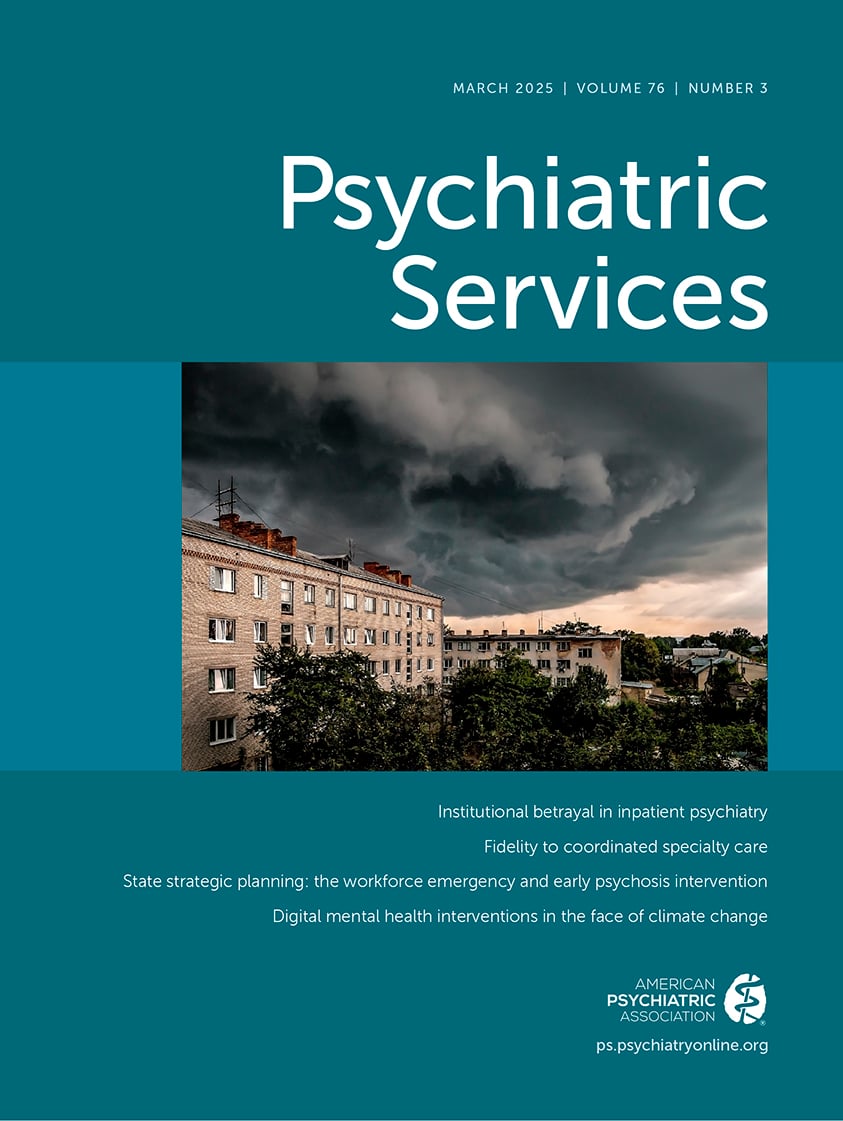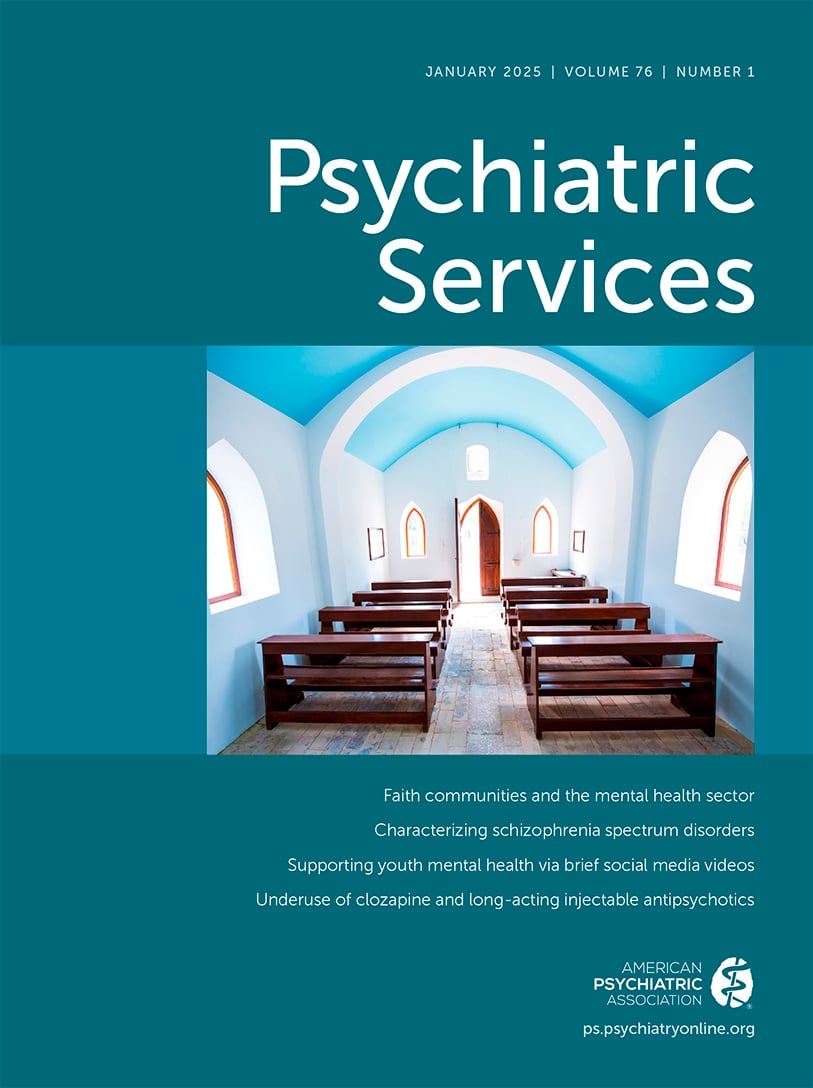Psychiatric Services
- Volume 71
- Number 11
- November 2020
Taking Issue
Viewpoint
Articles
Publication date: 23 September 2020
Pages1098–1103Objective: To assess the prevalence of bipolarity and its impact on clinical course, psychiatric consultants’ diagnostic impressions and respective treatment outcomes were examined for patients with depression who were treated in a collaborative care model ...
https://doi.org/10.1176/appi.ps.202000024Publication date: 13 August 2020
Pages1104–1113Objective: Young people (ages 12–25) experience the highest risk of developing mental disorders; however, their uptake of and engagement with treatment is low. The study explored sociodemographic predictors of attendance and discontinuation of mental ...
https://doi.org/10.1176/appi.ps.201900491Publication date: 15 July 2020
Pages1114–1119Objective: The expanding need for mental health services on college campuses has increased interest in smartphone apps for mental health. Although apps can be effective tools, they can also present risks regarding privacy and lack of efficacy, and little ...
https://doi.org/10.1176/appi.ps.202000098Publication date: 04 August 2020
Pages1120–1126Objective: This study aimed to analyze the pathways to obtaining a diagnosis of autism spectrum disorder (ASD) within the Mexican health system. Methods: Parents of children with ASD (N=186) were approached at specialized health centers and interviewed about ...
https://doi.org/10.1176/appi.ps.201900518Publication date: 10 September 2020
Pages1127–1135Objective: This study sought to characterize recent trends in mental health visits of adult outpatients to primary care physicians (PCPs), specialty mental health providers (SMHPs), and other providers (non–primary care physicians, specialists other than ...
https://doi.org/10.1176/appi.ps.201900576Publication date: 25 August 2020
Pages1136–1142Objective: This study aimed to describe the implementation of the empirically supported Safety Planning Intervention (SPI) for adolescent suicidality in emergency services (ES) settings. Methods: Using an implementation science framework, the authors ...
https://doi.org/10.1176/appi.ps.201900563Publication date: 16 September 2020
Pages1143–1150Objective: In response to the COVID-19 pandemic, many psychiatrists have rapidly transitioned to telemedicine. This qualitative study sought to understand how this dramatic change in delivery has affected mental health care, including modes of telemedicine ...
https://doi.org/10.1176/appi.ps.202000250Publication date: 16 September 2020
Pages1151–1157Objective: Although specialized early intervention services (EISs) for psychosis promote engagement in care, a substantial number of individuals who receive these services are discharged from care earlier than expected. The main goal of this study was to ...
https://doi.org/10.1176/appi.ps.202000025Special Articles
Publication date: 10 June 2020
Pages1158–1162The response to the global COVID-19 pandemic has important ramifications for mental health systems and the patients they serve. This article describes significant changes in mental health policy prompted by the COVID-19 crisis across five major areas: ...
https://doi.org/10.1176/appi.ps.202000219Publication date: 03 June 2020
Pages1163–1169Interventions that integrate care for mental illness or substance use disorders into general medical care settings have been shown to improve patient outcomes in clinical trials, but efficacious models are complex and difficult to scale up in real-world ...
https://doi.org/10.1176/appi.ps.202000183Publication date: 10 June 2020
Pages1170–1178The United States is in the midst of a children’s mental health crisis, with rates of depression, anxiety, and suicide increasing precipitously. Evidence produced by children’s mental health services research can help address this crisis by informing ...
https://doi.org/10.1176/appi.ps.201900527Publication date: 16 September 2020
Pages1179–1187Objective: Individuals with serious mental illnesses represent a high-need, high-cost population. To address this population’s needs under the State Innovation Models Initiative, Maine assisted Medicaid-participating behavioral health providers in changing ...
https://doi.org/10.1176/appi.ps.201900490Brief Reports
Publication date: 03 September 2020
Pages1188–1190Objective: The coronavirus disease (COVID-19) pandemic has been recognized as causing a wide variety of behavioral health problems. Society must mitigate this impact by recognizing that COVID-19 can trigger people’s fears of exacerbating an existing mental ...
https://doi.org/10.1176/appi.ps.202000245Publication date: 23 September 2020
Pages1191–1194Objective: This study aimed to clarify the extent of community participation by individuals with serious mental illnesses in comparison with the general population. Methods: Participants with serious mental illnesses (N=300) were recruited from 21 outpatient ...
https://doi.org/10.1176/appi.ps.201900608Open Forum
Publication date: 10 June 2020
Pages1196–1198The Internet has fundamentally altered mental health clinicians’ “public selves,” challenging previous models of self-disclosure and maintenance of boundaries within treatment. The conception of a public self altered by the digital age presents both ...
https://doi.org/10.1176/appi.ps.202000078Culture & Mental Health Services
Publication date: 23 September 2020
Pages1199–1202Despite common perceptions of Asian Americans as a “model minority,” Asian American women have high rates of mental health challenges, including anxiety, depression, self-harm, and suicidal thoughts and behaviors. However, they show low utilization of ...
https://doi.org/10.1176/appi.ps.201900593Research, Community, & Services Partnerships
Publication date: 16 September 2020
Pages1203–1206The Crisis and Transition Services (CATS) program is a novel approach to safely transitioning youths from the emergency department to outpatient care. The program provides intensive community-based support during the high-risk period after discharge from ...
https://doi.org/10.1176/appi.ps.201900597Frontline Reports
Editor’s Choice
Past Issues
View Issues Archive
Vol. 76 | No. 3

Vol. 76 | No. 2

Vol. 76 | No. 1
